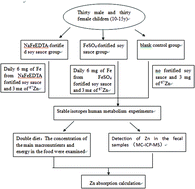Effect of NaFeEDTA-fortified soy sauce on zinc absorption in children
Abstract
NaFeEDTA has been applied in many foods as an iron fortificant and is used to prevent iron deficiency in Fe-depleted populations. In China, soy sauce is fortified with NaFeEDTA to control iron deficiency. However, it is unclear whether Fe-fortified soy sauce affects zinc absorption. To investigate whether NaFeEDTA-fortified soy sauce affects zinc absorption in children, sixty children were enrolled in this study and randomly assigned to three groups (10 male children and 10 female children in each group). All children received daily 3 mg of 67Zn and 1.2 mg of dysprosium orally, while the children in the three groups were supplemented with NaFeEDTA-fortified soy sauce (6 mg Fe, NaFeEDTA group), FeSO4-fortified soy sauce (6 mg Fe, FeSO4 group), and no iron-fortified soy sauce (control group), respectively. Fecal samples were collected during the experimental period and analyzed for the Zn content, 67Zn isotope ratio and dysprosium content. The Fe intake from NaFeEDTA-fortified and FeSO4-fortified groups was significantly higher than that in the control group (P < 0.0001). The daily total Zn intake was not significantly different among the three groups. There were no significant differences in fractional Zn absorption (FZA) (P = 0.3895), dysprosium recovery (P = 0.7498) and Zn absorption (P = 0.5940) among the three groups. Therefore, NaFeEDTA-fortified soy sauce does not affect Zn bioavailability in children.


 Please wait while we load your content...
Please wait while we load your content...